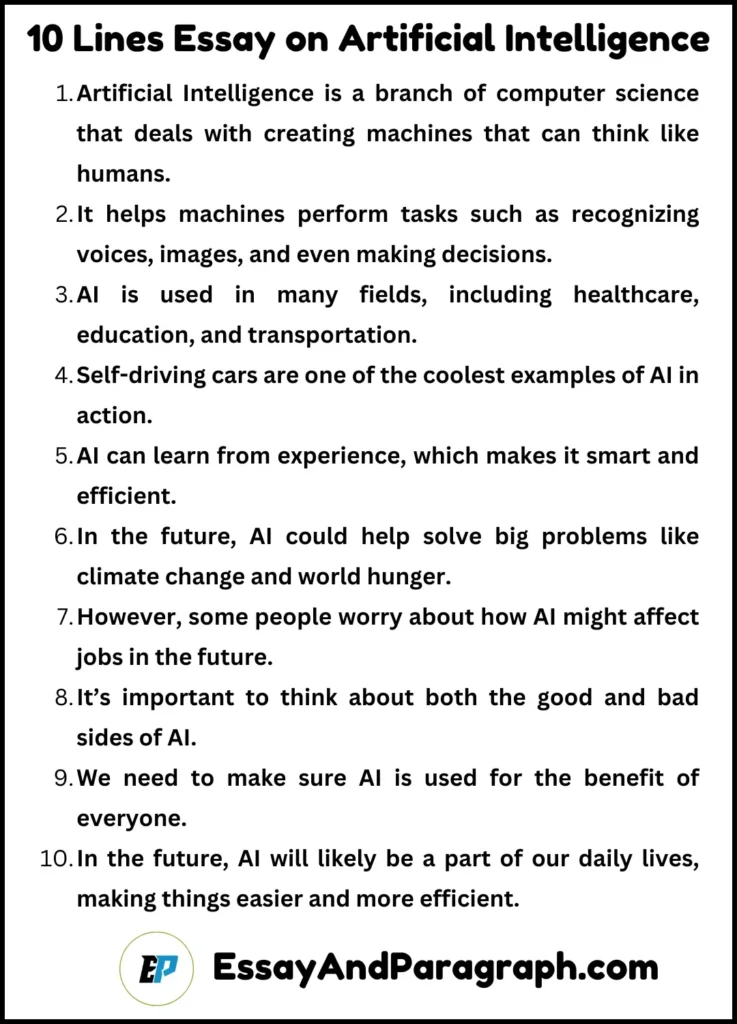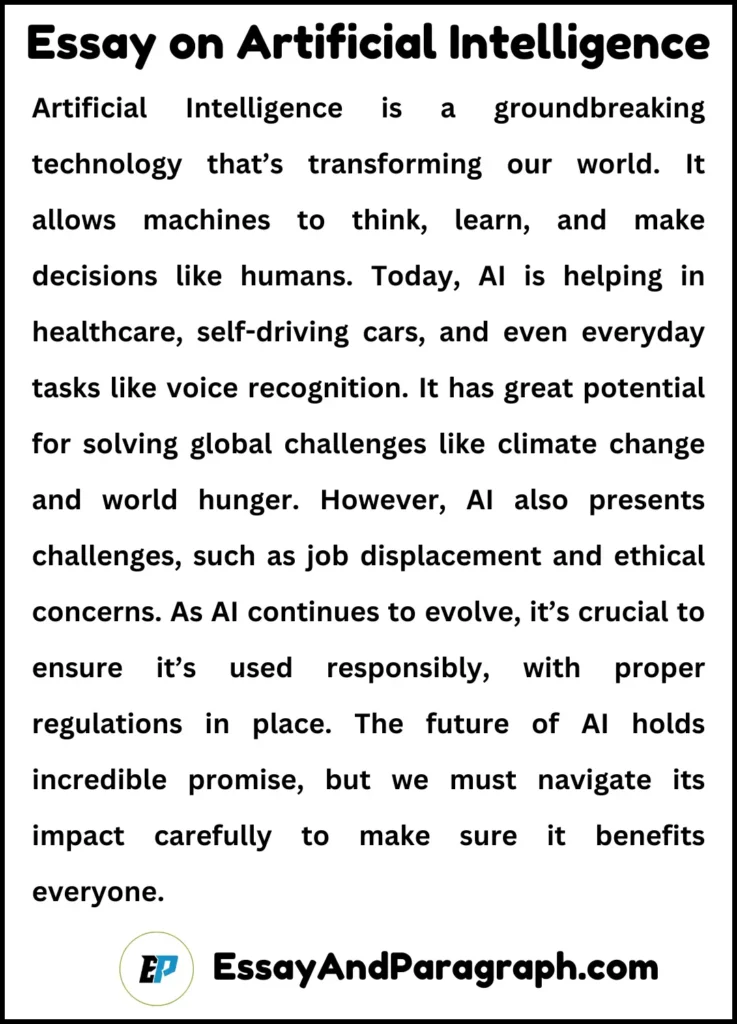Have you ever wondered how your phone understands your voice or how self-driving cars know where to go? It’s all thanks to something called artificial intelligence, or AI for short. AI is like a brain for machines, helping them learn and solve problems just like humans do. In this article, we will learn how to write an essay on artificial intelligence and explore how it’s changing the world.
10 Lines Essay on Artificial Intelligence
Artificial Intelligence is a branch of computer science that deals with creating machines that can think like humans.
It helps machines perform tasks such as recognizing voices, images, and even making decisions.
AI is used in many fields, including healthcare, education, and transportation.
Self-driving cars are one of the coolest examples of AI in action.
AI can learn from experience, which makes it smart and efficient.
In the future, AI could help solve big problems like climate change and world hunger.
However, some people worry about how AI might affect jobs in the future.
It’s important to think about both the good and bad sides of AI.
We need to make sure AI is used for the benefit of everyone.
In the future, AI will likely be a part of our daily lives, making things easier and more efficient.

Short Essay on Artificial Intelligence (100 words)
Artificial Intelligence is like a brain for computers and machines. It allows them to think, learn, and make decisions. AI helps in various areas like healthcare, where it can assist doctors in diagnosing diseases. In cars, AI enables self-driving features, making them safer and smarter. As AI continues to evolve, it could solve many global issues such as climate change. However, there are concerns about AI replacing jobs. It’s important for society to use AI responsibly to ensure it benefits everyone and does not cause harm. In the future, AI will be a major part of our lives.
Short Essay on Artificial Intelligence (150 words)
Artificial Intelligence (AI) refers to the ability of machines to perform tasks that usually require human intelligence, such as learning, reasoning, and problem-solving. AI has already started making a big impact in our everyday lives. For example, voice assistants like Siri and Alexa help us manage our tasks, while self-driving cars use AI to navigate roads safely. In healthcare, AI is helping doctors diagnose diseases faster by analyzing medical data.
However, AI also brings challenges. Many people are concerned about job losses, as machines may replace humans in certain jobs. There are also concerns about privacy and the fairness of AI systems, especially when they make decisions based on biased data.
Despite these concerns, AI holds great promise for solving important problems, such as climate change and global health issues. As AI continues to develop, it’s essential to use it responsibly to ensure it benefits everyone.
Long Essay on Artificial Intelligence (200 words)
Artificial Intelligence (AI) is transforming the way we live and work. It refers to machines or software that can perform tasks that usually require human intelligence, such as learning, problem-solving, and decision-making. AI is already helping in various industries. In healthcare, it assists doctors by analyzing medical images and diagnosing diseases quickly. In the field of transportation, self-driving cars use AI to navigate roads safely. AI also makes smartphones smarter by understanding speech commands and offering personalized recommendations.
While AI has many advantages, there are concerns about its impact on jobs. Some people worry that machines may replace human workers, leading to unemployment. Moreover, there are ethical questions surrounding the use of AI, such as privacy concerns and biases in algorithms. As AI continues to grow, it is crucial to develop regulations to ensure it benefits society.
Looking ahead, AI is expected to play an even more significant role in solving global challenges like climate change, healthcare, and education. However, it’s important that we use AI in a way that is ethical and fair for everyone. With the right balance, AI can be a powerful tool for improving our lives.
Short Essay on Artificial Intelligence (250 words)
Artificial Intelligence (AI) is a field of computer science that focuses on creating machines that can perform tasks that typically require human intelligence. These tasks include learning, problem-solving, and decision-making. AI is everywhere today, from voice assistants like Siri and Alexa to self-driving cars. In healthcare, AI helps doctors by analyzing medical data and identifying diseases faster than ever before. In education, it helps tailor learning experiences to individual students.
One of the most significant advantages of AI is its ability to process large amounts of data quickly. This makes it possible for machines to make decisions based on real-time information, improving efficiency in various industries like finance, manufacturing, and transportation. For example, AI-powered systems can detect fraud in banking or help optimize supply chains in large businesses.
However, there are some challenges and concerns regarding AI. Many people worry that machines may replace human jobs, leading to unemployment. There are also fears about privacy, as AI systems often collect and analyze personal data. Additionally, biases in AI algorithms can sometimes lead to unfair decisions.
Looking forward, AI holds great potential for solving complex global issues like climate change and healthcare disparities. However, it is important for society to approach AI development responsibly, with ethical guidelines and regulations in place. If used correctly, AI can be a powerful tool that benefits everyone, improving lives and creating new opportunities for growth and innovation.
Long Essay on Artificial Intelligence (500 words)
Artificial Intelligence (AI) is one of the most exciting and transformative technologies of the 21st century. It refers to the simulation of human intelligence in machines designed to think, learn, and perform tasks traditionally carried out by humans. AI is powered by algorithms, which are sets of instructions that allow machines to process data and make decisions. In its most advanced form, AI can even learn from experience, improving its performance over time without human intervention. As AI continues to evolve, it is revolutionizing industries and reshaping the way we live and work.
The applications of AI are vast and diverse. In healthcare, AI is playing a significant role in diagnosing diseases and assisting doctors in making better decisions. For instance, AI systems can analyze medical images, such as X-rays or MRIs, to identify abnormalities like tumors. These systems can often detect problems earlier than humans, leading to more effective treatments. Additionally, AI is being used to personalize patient care, with algorithms predicting which treatments will work best for individual patients based on their unique medical histories.
In the transportation industry, AI is powering self-driving cars, which could revolutionize how we travel. These vehicles rely on AI algorithms to process data from sensors, cameras, and radar systems to navigate roads and make decisions in real-time. This technology has the potential to reduce traffic accidents caused by human error, save lives, and make transportation more efficient.
AI is also making a significant impact on everyday life through personal assistants like Siri, Google Assistant, and Amazon’s Alexa. These AI-powered tools help us manage our schedules, answer questions, and control smart home devices, all through voice commands. AI is also embedded in social media algorithms, recommending posts and content tailored to individual preferences, creating a personalized experience.
Despite its many benefits, there are also challenges and concerns associated with AI. One major concern is the potential for job displacement. As AI becomes more capable of performing tasks traditionally done by humans, there is the possibility that many jobs will be automated, leading to unemployment and economic inequality. For example, in manufacturing, robots are already replacing human workers on assembly lines, and in fields like customer service, chatbots are taking over roles traditionally filled by human agents.
Another concern is the ethical implications of AI. For instance, AI systems can sometimes exhibit biases, especially if the data they are trained on contains biases. This can lead to unfair outcomes, such as discriminatory hiring practices or biased law enforcement algorithms. Additionally, AI raises questions about privacy, as these systems collect vast amounts of data about individuals. There are fears that this data could be misused or exploited by corporations or governments.
As AI continues to develop, it is essential to implement regulations and ethical guidelines to ensure that its benefits are maximized while minimizing potential harms. Governments, businesses, and researchers must work together to create policies that promote fairness, transparency, and accountability in AI development. For instance, AI systems should be designed to be explainable, meaning that humans can understand how they make decisions, which would help to build trust in AI technologies.
Looking forward, AI holds immense promise for solving some of the world’s most pressing challenges. It could help combat climate change by optimizing energy usage, developing cleaner technologies, and modeling the impact of environmental policies. In education, AI could personalize learning, helping students at different levels progress at their own pace. With the right balance of innovation and regulation, AI could be the key to solving complex global problems and creating a better future for all.
In conclusion, Artificial Intelligence is transforming industries, improving everyday life, and offering solutions to many global challenges. However, as AI continues to evolve, it is crucial that we address the ethical, social, and economic issues it presents. By approaching AI development with responsibility and care, we can ensure that this technology benefits society and helps create a more efficient, fair, and prosperous future.
FAQs on Artificial Intelligence
1. What is Artificial Intelligence?
Artificial Intelligence (AI) is the simulation of human intelligence in machines. It allows machines to learn, reason, and solve problems. AI can perform tasks that usually require human thinking, such as recognizing speech, making decisions, and translating languages. Examples include Siri, Google Assistant, and self-driving cars. AI is used in many fields, including healthcare, education, and business.
2. How does AI work?
AI works by using algorithms, which are sets of instructions that allow machines to analyze data and make decisions based on patterns. Machine learning is a key aspect of AI, where machines improve their performance over time as they process more data. The more data AI receives, the smarter it becomes at predicting outcomes and solving problems.
3. What are the benefits of AI?
AI offers many benefits, such as making tasks faster and more accurate. In healthcare, AI helps doctors diagnose diseases more quickly. In transportation, AI enables self-driving cars, making roads safer. AI can also automate repetitive tasks in industries, improving efficiency and reducing human error. Furthermore, AI has the potential to solve big problems like climate change and poverty.
4. What are the dangers of AI?
While AI has many benefits, it also comes with some risks. One major concern is job loss, as AI might replace human workers in certain industries. There are also worries about privacy, as AI systems collect and analyze large amounts of personal data. Additionally, AI can sometimes be biased, which means it might make unfair decisions. It’s important to create rules and regulations to ensure AI is used responsibly.
5. How can AI impact the future?
AI is expected to have a huge impact on the future. It could improve healthcare, education, and transportation, making them more efficient. AI might also help solve global challenges, like climate change and food scarcity. However, as AI becomes more powerful, it will be important to address its ethical concerns, such as job displacement and privacy issues, to ensure it benefits everyone.
Top 5 Quotes on Artificial Intelligence
“Artificial intelligence is the new electricity.” – Andrew Ng
“The future is already here — it’s just not very evenly distributed.” – William Gibson
“AI will not replace humans, but humans with AI will replace those without.” – Unknown
“The real question is not whether machines think but whether humans do.” – B.F. Skinner
“It is not the strongest of the species that survive, nor the most intelligent, but the one most responsive to change.” – Charles Darwin
Summary
Artificial Intelligence is a groundbreaking technology that’s transforming our world. It allows machines to think, learn, and make decisions like humans. Today, AI is helping in healthcare, self-driving cars, and even everyday tasks like voice recognition. It has great potential for solving global challenges like climate change and world hunger. However, AI also presents challenges, such as job displacement and ethical concerns. As AI continues to evolve, it’s crucial to ensure it’s used responsibly, with proper regulations in place. The future of AI holds incredible promise, but we must navigate its impact carefully to make sure it benefits everyone.




